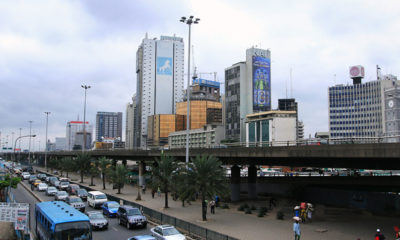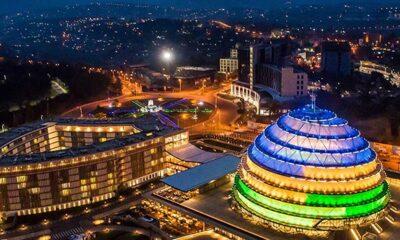- Nigerian Economy Expands at Slower Pace of 1.87% in Q1, 2020
Nigerian economy grew at a slower pace in the first quarter of the year as the negative impacts of global disruptions have started crystalising in Africa’s largest economy.
The disruption in global economy due to the coronavirus pandemic resulted in a sharp fall in global oil prices and weighed on economic activities towards the end of the quarter after the nation recorded its index case in February.
According to the National Bureau of Statistics (NBS), Nigeria’s Gross Domestic Product (GDP) expanded by 1.87 percent year-on-year in the first quarter (Q1) of 2020. This was 0.23 percent lower than the pace of growth recorded in Q1 2019 and 0.68 percent below the final quarter of 2019.
|
Q1 2019 |
Q2 2109 |
Q3 2019 |
Q4 2019 |
Total |
Q1 2020 |
| CONTRIBUTION TO GDP |
|
|
|
|
|
|
|
|
|
|
|
|
|
| AGRICULTURE |
21.89 |
22.78 |
29.25 |
26.09 |
25.16 |
21.96 |
| INDUSTRIES |
23.56 |
23.34 |
22.17 |
20.27 |
22.25 |
23.65 |
| SERVICES |
54.55 |
53.87 |
48.59 |
53.64 |
52.60 |
54.39 |
|
100.00 |
100.00 |
100.00 |
100.00 |
100.00 |
100.00 |
|
|
|
|
|
|
|
| NON OIL |
90.78 |
91.02 |
90.23 |
92.68 |
91.22 |
90.50 |
| OIL |
9.22 |
8.98 |
9.77 |
7.32 |
8.78 |
9.50 |
|
100.00 |
100.00 |
100.00 |
100.00 |
100.00 |
100.00 |
|
|
|
|
|
|
|
| GROWTH |
|
|
|
|
|
|
|
|
|
|
|
|
|
| AGRICULTURE |
3.17 |
1.79 |
2.28 |
2.31 |
2.36 |
2.20 |
| INDUSTRIES |
0.42 |
2.84 |
3.21 |
2.75 |
2.31 |
2.26 |
| SERVICES |
2.41 |
1.94 |
1.87 |
2.60 |
2.22 |
1.57 |
|
|
|
|
|
|
|
| REAL GROWTH RATE AT BASIC PRICE |
2.10 |
2.12 |
2.28 |
2.55 |
2.27 |
1.87 |
| REAL GROWTH RATE AT MARKET PRICE |
2.06 |
2.14 |
2.14 |
2.46 |
2.21 |
1.95 |
| NON OIL GROWTH RATE |
2.47 |
1.64 |
1.85 |
2.26 |
2.06 |
1.55 |
| OIL GROWTH RATE |
-1.46 |
7.17 |
6.49 |
6.36 |
4.59 |
5.06 |
On a quarterly basis, the real GDP contracted by 14.27 percent when compared with the 5.59 percent growth rate recorded in the preceding quarter. This, the bureau attributed to the effects of the disruption in global supplies, especially in the non-oil sector of the economy.
In the quarter, aggregate GDP rose to N35,647,406.08 million with a growth rate of 12.01 percent in nominal terms. This was better than the N31,824,349.67 million reported in the first quarter of 2019 and 0.11 percent higher than the nominal growth rate but 0.32 percent lower than the preceding quarter.
Oil Sector
In the first quarter, Nigeria produced 2.07 million barrels per day, more than the 1.99 mbpd recorded in Q1, 2019 and 0.06 mbpd higher than the fourth quarter of 2019.
Accordingly, the sector expanded by 5.06 percent year-on-year in the first quarter, an increase of 6.51 percent when compared to the corresponding quarter of 2019. Growth, however, decreased by 1.30 percent when compared with Q4 2019.
On a quarterly basis, the sector grew by 11.30 percent in the first quarter, contributing 9.50 percent to aggregate real GDP. Higher than the percentage contributed in the first quarter of 2019 as the share of the non-oil sector declined due to the COVID-19 pandemic.
Non-oil Sector
The uncertainty surrounding the global economy weighed on the non-oil sector in the first quarter as the sector grew by 1.55 percent in real terms. This was 0.93 percent slowed than the rated filed for the same quarter of 2019 and 0.72 percent slower than the fourth quarter of 2019.
The sector was mainly driven by Information and Communication (Telecommunications), Financial and Insurance (Financial Institutions), Agriculture (Crop Production), Mining and Quarrying (Crude Petroleum & Natural Gas), and Construction, the NBS stated.
In real terms, the sector accounted for 90.50 percent of Nigeria’s GDP in the first quarter, slightly below the 90.78 percent and 92.68 percent recorded in the first quarter and fourth quarter of last year respectively.
It should be noted that while the report reflects the negative impact of COVID-19, it did not capture the full impact on the economy as COVID-19 broke out in Nigeria on February 27 and lockdown was announced in the last week of March. Therefore, the second quarter report would likely contract as economic activities were down most of the quarter.

 Naira4 weeks ago
Naira4 weeks ago


 Naira4 weeks ago
Naira4 weeks ago


 Naira3 weeks ago
Naira3 weeks ago


 News4 weeks ago
News4 weeks ago
 Travel4 weeks ago
Travel4 weeks ago




 Naira4 weeks ago
Naira4 weeks ago


 Jobs3 weeks ago
Jobs3 weeks ago
 Naira3 weeks ago
Naira3 weeks ago






















